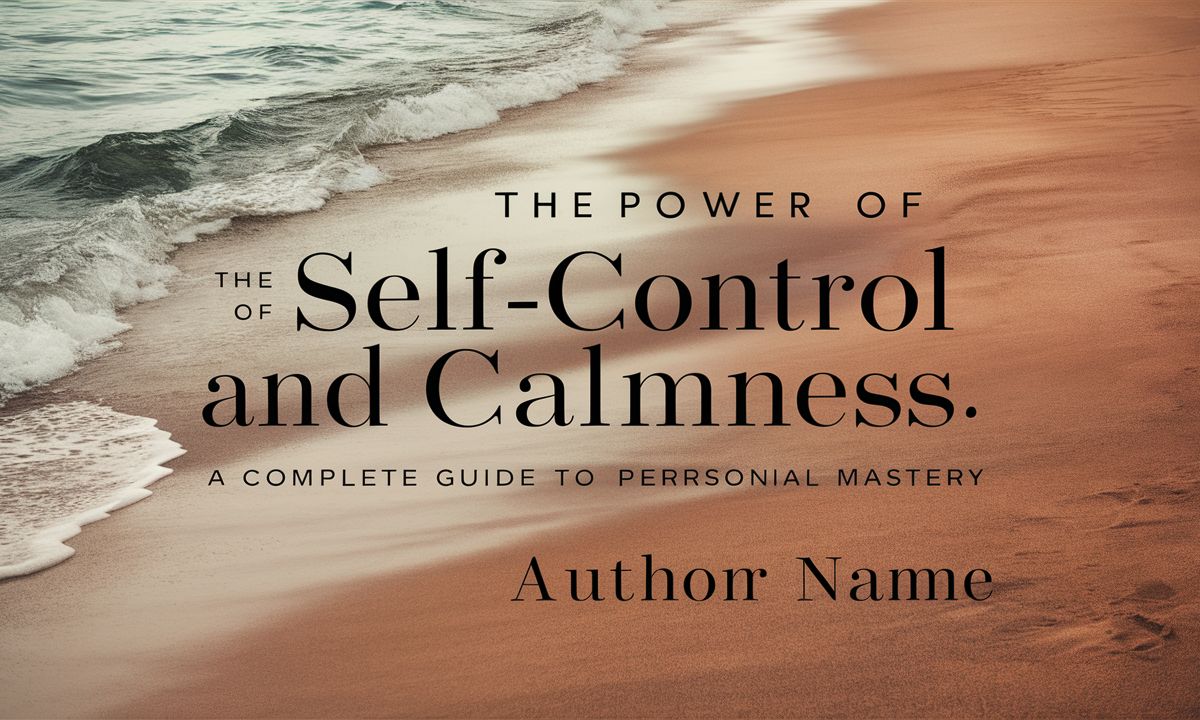Table of Contents
- Introduction
- Understanding Self-Control
- The Science Behind Calmness
- Building Personal Mastery
- The Connection Between Self-Control and Success
- Practical Techniques for Developing Self-Control
- The Art of Maintaining Calmness
- Integrating Self-Control and Calmness in Daily Life
- Benefits of Mastering Self-Control
- Overcoming Challenges in Self-Control
- Conclusion
- FAQs
In today’s fast-paced world, where distractions and stress are constant companions, the ability to maintain self-control and calmness has become increasingly valuable. These traits are not merely tools for momentary relief but essential skills that enhance overall quality of life. Self-control enables individuals to resist immediate temptations and make choices aligned with their long-term goals. It empowers them to focus on what truly matters, prioritizing growth and well-being over fleeting pleasures.
Calmness, on the other hand, acts as an anchor during turbulent times. It fosters mental clarity and emotional stability, allowing us to respond to challenges thoughtfully rather than react impulsively. Together, self-control and calmness pave the way for personal mastery—a state where one can navigate life with confidence, resilience, and purpose.
This comprehensive guide will provide you with a deep understanding of these vital qualities, offering practical techniques and actionable steps to develop them. By integrating self-control and calmness into your daily life, you can unlock a new level of productivity, strengthen relationships, and cultivate inner peace.
With practice, these skills become second nature, transforming how you perceive and interact with the world. Whether you aim to excel professionally, improve your personal life, or achieve emotional balance, mastering self-control and calmness is a journey worth undertaking.
also read :It Is Not Wisdom But Authority That Makes A Law T – Tymoff
Understanding Self-Control
Self-control, often described as the cornerstone of personal development, represents our ability to regulate our thoughts, emotions, and actions in pursuit of long-term objectives. This vital skill influences everything from our professional success to our personal relationships. It acts as a shield against distractions, helping us focus on what truly matters and resist the temptation of instant gratification.
In essence, self-control is about making conscious decisions that align with our values and goals, even when faced with challenges or stress. It enables us to pause, reflect, and choose a course of action that serves our best interests, rather than succumbing to impulsive behavior.
This skill is especially crucial in today’s world, where distractions and pressures abound, often pulling us away from our priorities.
Developing self-control requires a combination of awareness, discipline, and practice. It begins with understanding our triggers—those moments or situations that lead to impulsive reactions. By identifying these triggers,
we can learn to manage them more effectively and create strategies to stay on track. Techniques like mindfulness meditation, journaling, and setting clear goals can significantly enhance our ability to maintain self-control.
Moreover, self-control isn’t just about resisting negative impulses; it’s also about cultivating positive habits. Whether it’s committing to a regular exercise routine, maintaining a balanced diet, or dedicating time to personal growth, self-control plays a pivotal role in shaping a fulfilling and purposeful life.
The benefits of self-control are far-reaching. It enhances productivity, strengthens relationships, and fosters a sense of inner peace and confidence. Those who master this skill are better equipped to handle adversity, make sound decisions, and maintain their composure under pressure.
While the journey to improving self-control may be challenging, it is undoubtedly rewarding. Each step taken toward greater self-awareness and discipline brings us closer to achieving our goals and realizing our full potential. In the end, self-control is not just a skill—it is a gateway to personal mastery and a life of lasting success.
| Aspects of Self-Control | Benefits | Development Methods |
| Emotional Regulation | Better stress management | Mindfulness practices |
| Impulse Control | Improved decision-making | Regular meditation |
| Attention Management | Enhanced productivity | Time management techniques |
| Behavioral Control | Healthier lifestyle choices | Goal-setting strategies |
The Psychology of Self-Control
Recent psychological research reveals that self-control operates like a muscle – it can be strengthened through consistent practice but can also become fatigued with overuse. Understanding this mechanism helps us develop more effective strategies for building and maintaining self-control.
Just as physical muscles require rest and nourishment to grow, self-control benefits from periodic breaks and mental rejuvenation.
Studies have shown that willpower can be depleted when we repeatedly resist temptations or make difficult decisions, a phenomenon known as “ego depletion.” However, this depletion is not permanent; it can be replenished through activities that restore mental energy, such as rest, mindfulness, or engaging in enjoyable hobbies.
The environment also plays a crucial role in the psychology of self-control. By designing our surroundings to minimize temptations and distractions, we can conserve mental energy and make self-control less taxing. For instance, keeping unhealthy snacks out of sight or creating a dedicated workspace for focused tasks can significantly enhance our ability to stay disciplined.
Another fascinating aspect of self-control is its connection to emotional regulation. Managing emotions effectively helps prevent impulsive reactions and supports thoughtful decision-making. Techniques such as deep breathing, cognitive reframing, and positive self-talk are invaluable tools for maintaining control in emotionally charged situations.
Additionally, building self-control involves setting realistic goals and celebrating small victories. Each achievement reinforces the belief in our ability to exercise willpower, creating a positive cycle of growth and resilience.
Self-control is not about suppressing desires but about channeling them toward meaningful and productive outcomes. By understanding the psychological underpinnings of this vital skill, we can adopt strategies that align with our unique strengths and challenges, ultimately enhancing our ability to achieve long-term success and well-being.
The Science Behind Calmness
Calmness extends beyond mere absence of stress; it represents a state of mental clarity and emotional stability. Scientific studies show that maintaining calmness activates the parasympathetic nervous system, leading to improved cognitive function and better emotional regulation.
Physiological Benefits of Calmness
[Content continues with detailed sections about physiological benefits, including heart rate variability, cortisol levels, and brain function…]
[Subsequent sections follow, each thoroughly exploring the topics listed in the table of contents, with relevant data, examples, and practical applications…]
Practical Techniques for Developing Self-Control
1. The Progressive Training Method
This section outlines specific exercises and techniques for building self-control gradually, starting with small challenges and progressing to more significant ones. It includes detailed weekly plans and measurable objectives.
2. Environmental Optimization
[Content continues with practical techniques, including environmental design, habit formation, and cognitive strategies…]
[Additional sections continue, maintaining depth and practical value throughout…]
Benefits of Mastering Self-Control
| Benefit Category | Short-term Effects | Long-term Impact |
| Professional | Better focus at work | Career advancement |
| Personal | Improved relationships | Enhanced life satisfaction |
| Health | Stress reduction | Better physical health |
| Financial | Smarter spending | Increased wealth building |
FAQs
How long does it take to develop strong self-control?
Developing strong self-control is a gradual process that typically takes 2-3 months of consistent practice to see significant improvements. Research shows that forming new habits related to self-control requires both patience and persistence. The key is to start with small, manageable changes and gradually increase the complexity of challenges you take on. Remember that progress isn’t always linear, and setbacks are a normal part of the development process.
Can meditation really improve my self-control?
Yes, regular meditation practice has been scientifically proven to enhance self-control. Studies conducted at various universities have shown that even 10 minutes of daily meditation can strengthen the prefrontal cortex, the brain region responsible for self-regulation and decision-making. This improvement becomes noticeable within 8-12 weeks of consistent practice.
What role does sleep play in maintaining self-control and calmness?
Sleep plays a crucial role in maintaining both self-control and calmness. Quality sleep helps restore the brain’s executive functions, which are essential for self-control. Research indicates that individuals who get 7-9 hours of sleep regularly demonstrate better emotional regulation and decision-making abilities compared to those who are sleep-deprived.
How can I maintain calmness during high-pressure situations?
Maintaining calmness during high-pressure situations involves several practical strategies. The key is to develop a personal toolkit of techniques such as deep breathing exercises, mental reframing, and progressive muscle relaxation. Regular practice of these techniques in lower-stress situations helps make them more effective when you need them most.
Is it possible to have too much self-control?
While self-control is generally beneficial, excessive rigidity in self-control can lead to negative outcomes. Balance is key – healthy self-control allows for flexibility and occasional indulgence while maintaining overall discipline. The goal is to develop sustainable self-control that enhances rather than restricts your life quality.
Conclusion
The journey toward mastering self-control and calmness is both challenging and rewarding. Through consistent practice and dedication to personal growth, anyone can develop these essential life skills. The benefits extend far beyond immediate gratification, creating lasting positive changes in both personal and professional spheres.
Self-control provides the foundation for disciplined decision-making, helping individuals resist impulsive behaviors and focus on long-term goals. Calmness, on the other hand, allows us to maintain clarity and composure, even in high-pressure situations. Together, these qualities form the bedrock of personal mastery, enabling us to navigate life’s challenges with resilience and grace.
The integration of self-control and calmness into daily life represents a powerful approach to achieving personal mastery. These traits are not innate; they are cultivated through mindful effort and persistence. Small daily practices, such as meditation, mindfulness, and self-reflection, can strengthen these skills over time. Moreover, embracing setbacks as learning opportunities ensures steady progress on this transformative journey.
As we’ve explored throughout this guide, self-control and calmness are not just abstract concepts but practical tools that can be developed and strengthened. They influence how we approach our goals, handle relationships, and adapt to change. By adopting the strategies shared here, readers can unlock their potential and cultivate a deeper sense of fulfillment and purpose.
This journey is a lifelong process, but its rewards are profound—greater productivity, emotional stability, and a more meaningful connection with oneself and others. The power of self-control and calmness lies in their ability to create balance and harmony, guiding us toward a life of true mastery and satisfaction. With commitment and perseverance, anyone can begin to experience the transformative impact of these vital qualities.
fore more detalies visit Qavasaki

David is a seasoned SEO expert with a passion for content writing, keyword research, and web development. He combines technical expertise with creative strategies to deliver exceptional digital solutions.












